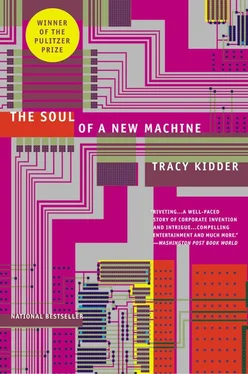It was 1976. By degrees West had taken command of the Eclipse Group. He and his small team were, as he put it, pounding out new 16-bit Eclipses. Meanwhile, the group’s former leader and another team of engineers were working on the monumental new machine, which would solve the logical-address problem, among others. The monumental machine had taken on the code name FHP, an abbreviation for “the Fountainhead Project.” The team designing FHP repaired to a suite in the Fountainhead Apartments—a local edifice that lends a touch of Miami Beach to the town of Westborough—in order to pursue their work. West’s Eclipse Group carried on at headquarters, extending the successful line of Eclipses. And all might have proceeded this way, in relative harmony, but for politics.
Data General had built a new research facility in a place called Research Triangle Park, in North Carolina, a state that had made itself comely to industry, partly by keeping taxes low. While lauding the government of North Carolina, Data General’s spokesmen rather bitterly denounced Massachusetts, where taxes of all sorts run high. Edson de Castro himself joined in the criticism. One company spokesman went so far as to lament the fact that Data General had chosen to grow up in the Bay State. In reporting such comments, none of the Boston papers bothered to point out that the many universities and institutes of technology, existing tax free in Massachusetts, had produced much of the technology and many of the technologists that had made a Data General possible in the first place. But Data General’s front office wasn’t complaining without reason. In Massachusetts, as elsewhere, 1976 happened to be an election year, and the company was throwing its weight against several propositions on the ballot that threatened to increase both Data General’s operating expenses and the personal income taxes of its better-paid employees.
As it turned out, most of the company’s favored causes won. No doubt Data General’s campaign had an influence. The opening of the facility in Research Triangle Park, North Carolina, and the political campaign, however, had some unfortunate side effects on some of the company’s engineers.
For one thing, word had come down that the FHP project was being transferred to North Carolina. Some of the engineers who had been working on that grand new machine refused to pack up their families and go south. At least some of them felt robbed. “You gotta understand,” said West later. “FHP was the one thing in the world they wanted to do most, the biggest-thing-the-world’s-ever-seen kind of thing. Somebody told those guys that they would have seventy-two uninterrupted hours with the girl of their dreams. The thing they most wanted to do was dangled before them and then pulled away. And some people were pissed.”
Then there was the newspaper story. One morning, after FHP’s departure had been announced, a number of the engineers at Westborough, who felt of course that they were good, productive, “can-do” engineers, picked up the Boston Globe and saw in it an article about themselves. It read in part:
Speaking to the Boston Security Analysts Society, de Castro said his company, the second largest minicomputer producer in the world, was finding it “a great deal easier to staff [its research-and-development center] in North Carolina. People are more willing to move into that area than Boston.”
… In addition to this 20 percent cost-of-living difference, which is a combination of taxes, insurance, housing, food and other costs, de Castro said the Research Triangle Park area has “a different feel” than the research facility the company maintains in Westborough. “The ambition level is different…. There is a can-do attitude and that environment is contagious.”
West remembered the aftermath, laughing low and shaking his head: “De Castro called us all together and in his inimitable fashion totally confused everyone. He said that the press distorts things and I hope you know that even if I believed that quote I wouldn’t say it. Then he gave us the march to victory speech and left.” West added, “Morale hit an all-time low at Westborough.”
Various accounts of how matters stood among the engineers there suggest that many believed Westborough’s days as an interesting place to work were about over. Sure, said West, people there could continue to build NOVAs and Eclipses. “But what fun is that?” Some of those who were going south with FHP boasted that they were going to the place where the action would be. And indeed it looked as though the important new machines, the sorts of projects that a significant number of Westborough’s engineers wanted to work on, would thereafter be pursued in North Carolina.
Some of the engineers who had chosen New England over FHP fell under West’s command, more or less. And the leader of the FHP project suggested that those staying behind make a small machine that would solve the 32-bit, logical-address problem and would at the same time exhibit a trait called “software compatibility.”
Some of those who stayed behind felt determined to build something elegant. They designed a computer equipped with something called a mode bit. They planned to build, in essence, two different machines in one box. One would be a regular old 16-bit Eclipse, but flip the switch, so to speak, and the machine would turn into its alter ego, into a hot rod—a fast, good-looking 32-bit computer. West felt that the designers were out to “kill North Carolina,” and there wasn’t much question but that he was right, at least in some cases. Those who worked on the design called this new machine EGO. The individual initials respectively stood one step back in the alphabet from the initials FHP, just as in the movie 2001 the name of the computer that goes berserk—HAL—plays against the initials IBM. The name, EGO, also meant what it said.
The people working on EGO, nominally working for West but in fact amenable then to no one’s control, truly labored. They worked nights. They worked weekends. They argued hotly with each other. “It was the most incredible, soaring experience of my life,” said one of them later. And they worked with astonishing speed. Within two months they had a fairly complete specification. Then they took it to de Castro.
To a disinterested observer it might have seemed obvious that Data General wasn’t going to field both EGO and North Carolina’s machine. The costs of supporting the two radically new CPUs would be prohibitive. Data General could sensibly afford only one major new machine, and Data General is almost always sensible about money. According to West, and others, de Castro told him and his troops to work out their differences with North Carolina. They didn’t. To some of the engineers who worked on EGO, what ensued was a “war,” and the first open battle, which was fought at a Howard Johnson’s motor inn down south, was “the big shoot-out at HoJo’s.” Carl Alsing, who was not a participant but an interested observer, said: “I imagine the great EGO wars as a pen-and-ink drawing. Snarling engineers are shown hurling complexities at each other.”
Which processor was better? Which deserved to receive the support and resources of the company? Those were the stakes.
Fights like these often take place inside computer companies. So it is said. Here the winner was foreordained. When it came to rating the talents of the engineers, everyone had to agree that some of the company’s finest stood behind EGO, but North Carolina’s leader was generally acknowledged to be the company’s stellar designer after de Castro. Moreover, the company had made a substantial investment in North Carolina as a research-and-development facility, and Data General is a company that likes to see its investments pay off without undue delay. “EGO was a group of five people, FHP had fifty. You’re not gonna kill a group of fifty. The company’s not gonna send FHP to North Carolina and then do EGO,” said West. But that was later on. At this time he argued strongly for EGO. At a meeting before de Castro in September 1977, the two sides traded promises. Westborough would do EGO in a year. Well, then, North Carolina would do a version of FHP in a year. West remembered: “De Castro looked around the room and said, ‘It’s a dilemma.’ It’s a famous quote for him, never heard before or since. I said, ‘Okay, we’ll stop building EGO,’ and de Castro walked out of the room.”
Читать дальше











